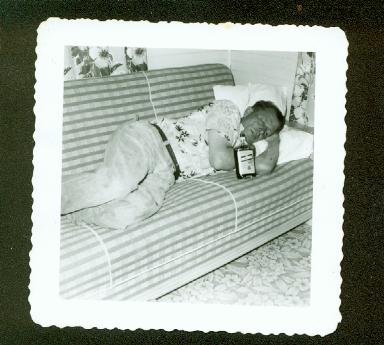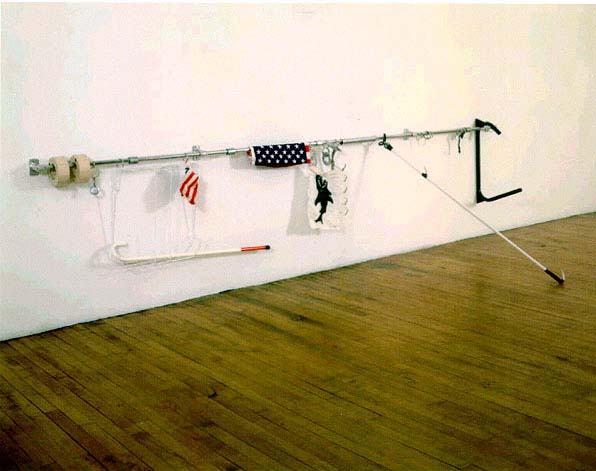Schwarz
View current page
...more recent posts
Then she suggested I check out the reasons why Warhol loves America so much, because he was in love with his country’s democracy, and saw no difference between a still-life painting of a bowl of fruit and 8,000 identical silkscreen prints of canned tomato soup. In America, the infinitely reproducible is better respected than the one-off. Mass appeal is more important than masterworks. Warhol said, “What’s great about this country is that America started the tradition where the richest consumers buy essentially the same things as the poorest. You can be watching TV and see Coca-Cola, and you can know that the President drinks Coke, Liz Taylor drinks Coke, and just think, you can drink Coke too. A Coke is a Coke and no amount of money can get you a better Coke than the one the bum on the corner is drinking. All the Cokes are the same and all the Cokes are good. Liz Taylor knows it, the President knows it, the bum knows it, and you know it.”
Of course, not everything in America is made of Coke. Warhol knows this. “When I was dying,” he said, recalling his stay in hospital recuperating from being shot by Valerie Solanas in 1968, “I had to write my name on a check.” As a comment on democratic materialism, Warhol named his studio The Factory and said, “I don’t understand anything but GREEN BIILS.” His subject was supply and demand so there couldn’t be just one masterpiece, there had to be 8,000. And great business is to be had in the art world if you’ve got an eye for what people desire. Because there’s always the matter of some great synchronicity when it comes to desire, and more than just money goes toward true love. You crush on art when you least expect it. Around the next corner, a piece of art is going to change your life. There’s never a choice in the matter.
Art isn’t democratic. It exists outside that sphere completely. Art is the only god you can prove exists. Everything else is mortal. The filmmaker Pier Palo Passolini called poetry “inconsumable,” and Warhol’s art, although it is about consumption, is forever inconsumable. And his book From A to B is inconsumable, too, because it is poetry, a very pure form of art, at once private while invariably connecting us to one another, as if by a lovely fluke
In several dozen nondescript office buildings around the world, thousands of hourly workers bend over table-top scanners and haul dusty books into high-tech scanning booths. They are assembling the universal library page by page.
The dream is an old one: to have in one place all knowledge, past and present. All books, all documents, all conceptual works, in all languages. It is a familiar hope, in part because long ago we briefly built such a library. The great library at Alexandria, constructed around 300 B.C., was designed to hold all the scrolls circulating in the known world. At one time or another, the library held about half a million scrolls, estimated to have been between 30 and 70 percent of all books in existence then. But even before this great library was lost, the moment when all knowledge could be housed in a single building had passed. Since then, the constant expansion of information has overwhelmed our capacity to contain it. For 2,000 years, the universal library, together with other perennial longings like invisibility cloaks, antigravity shoes and paperless offices, has been a mythical dream that kept receding further into the infinite future.
Until now. When Google announced in December 2004 that it would digitally scan the books of five major research libraries to make their contents searchable, the promise of a universal library was resurrected. Indeed, the explosive rise of the Web, going from nothing to everything in one decade, has encouraged us to believe in the impossible again. Might the long-heralded great library of all knowledge really be within our grasp?
Brewster Kahle, an archivist overseeing another scanning project, says that the universal library is now within reach. "This is our chance to one-up the Greeks!" he shouts. "It is really possible with the technology of today, not tomorrow. We can provide all the works of humankind to all the people of the world. It will be an achievement remembered for all time, like putting a man on the moon." And unlike the libraries of old, which were restricted to the elite, this library would be truly democratic, offering every book to every person.
But the technology that will bring us a planetary source of all written material will also, in the same gesture, transform the nature of what we now call the book and the libraries that hold them. The universal library and its "books" will be unlike any library or books we have known. Pushing us rapidly toward that Eden of everything, and away from the paradigm of the physical paper tome, is the hot technology of the search engine.
continue reading
ken johnson for the new york times sets his critical sites on appropriation art.
are any of us safe?
here we are reminded that irony was suspended shortly after 9/11. i contend that that suspension lasted through the 2004 elections and only returned in a significant way via colberts wh press diner appearance. i think katrina was a crack in the magicians mirror we know as the bush and co parallel universe. the cheney hunting event was a little peak behind the curtain too. a society needs irony to self regulate. some things can only be spoken first through humor. then we start to get comfortable with the truth again and with that a return to normalage. i find the term bush "bubble" a misnomer or at least an severe understatement. thats why this story is so significant and a watershed event for me. for the first time in a long while i sense weve turned the corner in accepting/not accepting the whole bush co alternate universe routine. god bless andy breckman too, i think he missed the irony memo altogether.
"Soon after Sept. 11, Graydon Carter, editor of Vanity Fair, announced that we had reached the "end of the age of irony." The comment was particularly odd since Carter was one of the co-founders of Spy, the often brilliant and irony-rich satirical magazine of the 1980s.
[....]
Why did the media so uniformly ignore Colbert? For one thing, his performance as a Republican-licking pundit held a mirror up to the media's sycophancy as much as it criticized Bush. So, by ignoring the criticism of them, the media whores performed in just the way Colbert described their reporting of, say, the period before the Iraq invasion. They ignored reality -- it has a liberal bias, Colbert observed -- and slavishly licked Bush's ass clean.
Of course, many in the media, as well as the conservative robots on the Internet, produced their own reason for not reporting Colbert's shtick. It simply wasn't funny, they said. Well, of course it isn't too funny if your own idiocy was being reflected.
That again comes back to the question of satire's function. It isn't meant to produce slapstick laughs. It is meant to make people think about the absurdity in which they are participating. In fact, satire assumes, and usually demonstrates, that its object is capable of behaving differently."


